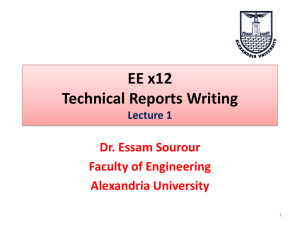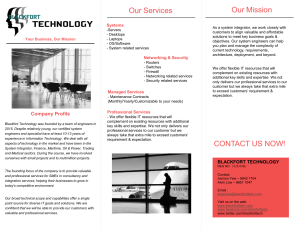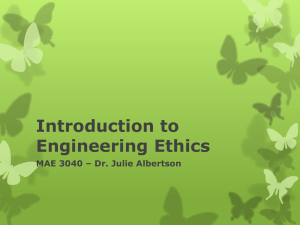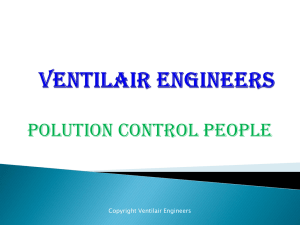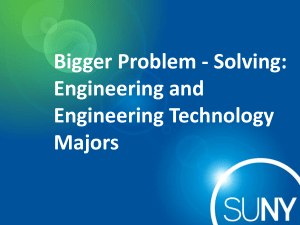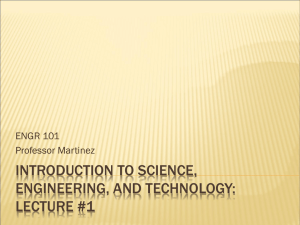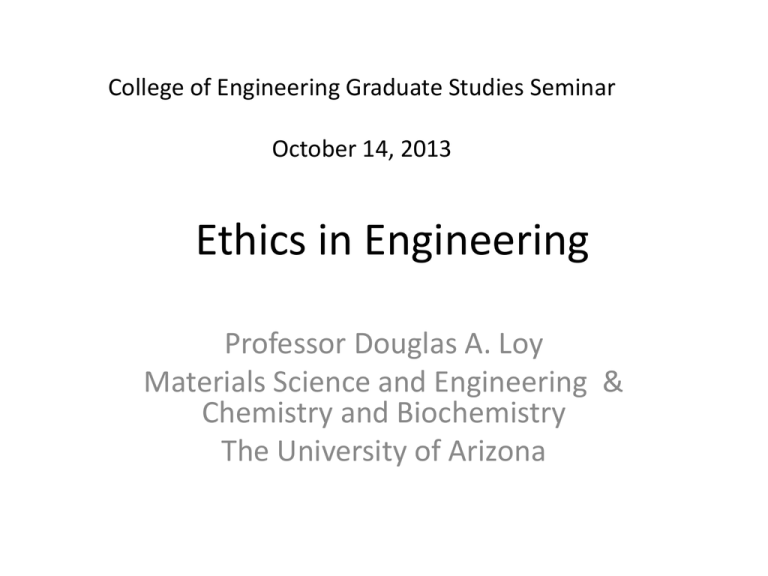
College of Engineering Graduate Studies Seminar
October 14, 2013
Ethics in Engineering
Professor Douglas A. Loy
Materials Science and Engineering &
Chemistry and Biochemistry
The University of Arizona
Ethics
• Why do engineers need ethics?
• Professional codes of ethics
• Practical information
–
–
–
–
Professional responsibilities
Whistle blowing
Cheating
Gifts & bribes
• Ethics in research
• Summary
Audience Participation:
You are an engineer in charge of a product’s
production at a large microelectronics firm and
you are hosting a group from a company that
wishes to become a supplier of a key material
used in the manufacture of your company’s
product. One of the visitors offers to let you
watch a professional football game from the
corporate box.
Should you accept the offer? Why?
Audience Participation:
You are an engineer in charge of a product’s
production at a large microelectronics firm and
you are hosting a group from a company that is
the supplier of a key material used in the
manufacture of your company’s product. One
of the visitors offers to let you watch a
professional football game from the corporate
box.
Should you accept the offer? Why?
Audience Participation:
You are on an engineering team and discover
that the project design is flawed, requiring a
complete re-design and will likely result in losing
the contract worth billions. The flaw would
very likely lead to deaths if left in the product.
Loss of the contract will mean laying off at least
half of your team and most assuredly nix your
promotion. What do you do?
Audience Participation:
You are on an engineering team and discover
that the project design is flawed, requiring a
complete re-design and will likely result in losing
the contract worth billions. The flaw, if left in
the product, would mean possibly not meeting
specifications but would not be apparent until
after production is underway. Loss of the
contract will mean laying off at least half of your
team and most assuredly nix your promotion.
What do you do?
Audience Participation:
You are on an engineering team and discover
that the project design is flawed, requiring a
complete re-design and will likely result in losing
the contract worth billions. Loss of the contract
will mean laying off at least half of your team
and most assuredly nix your promotion. You
can’t see the solution to the problem and tell
your your boss who says “to keep quiet; the
team can figure it out after the contract is in the
bag.” What do you do?
Why do engineers need ethics?
To help make the right decisions under
circumstances where it may not necessarily
be clear what to do.
Engineering ethics course is not about
preaching virtue rather, its objective is to
increase your ability as engineers to
responsibly confront moral issues raised by
technological activity.
What are ethics?
“Also known as moral philosophy, ethics is a
branch of philosophy that involves
systematizing, defending and recommending
concepts of right and wrong.”
Morals: standards of behavior or beliefs
concerning what is and is not acceptable for them
to do.
Wikipedia.
Ethics vs Law
• Laws set form legal, enforced boundaries that
may or may not be based on ethics. Rule
based ethics.
• Ethics are more general, impartial values that
may often not be legally enforced.
ideal
ethics
real
ethics
Laws
Laws
Why Behave Ethically?
• It works – a capitalistic economy is based upon
competition in an open and free market. Bribery and
other unethical forms of behavior corrupt the freemarket mechanism.
• Your professional reputation depends upon it.
• Your behavior reflects upon your employer, coworkers,
university, race, sex, nationality, and the entire
engineering profession.
• It’s morally the right thing to do.
• It’s what is expected of you as a professional.
You will frequently need to consider ethics during
your career as an engineer
Professional standards
Quality control
Communication about flaws
Bribery/Gifts/conflicts of interest
Intellectual property
Giving credit where due
Personnel issues
How to Resolve Ethical Dilemmas
•
•
•
•
•
•
•
•
Identify relevant facts
Identify relevant issue(s)
Identify primary stakeholders
Identify possible solutions
Evaluate each possible solution
Compare and assess consequences
Decide on solution
Take action
Engineering Ethics are Rules for behavior:
Many, very similar professional codes
•
•
•
•
•
National Society of Professional Engineers
ABET
IEEE
ASCE
AICHE
NSPE Fundamental Canons
Engineers, in the fulfillment of their professional duties,
shall:
1) Hold paramount the safety, health, and welfare of the public.
2) Perform services only in areas of their competence.
3) Issue public statements only in an objective and truthful manner.
4) Act for each employer or client as faithful agents or trustees.
5) Avoid deceptive acts.
6) Conduct themselves honorably, responsibly, ethically, and
lawfully so as to enhance the honor, reputation, and usefulness
of the profession.
NSPE Code of Ethics for Engineers
http://www.nspe.org/Ethics/CodeofEthics/index.html
Rules of Practice
1) Engineers shall hold paramount the safety, health, and welfare of the
public.
a) If engineers' judgment is overruled under circumstances that endanger life
or property, they shall notify their employer or client and such other authority
as may be appropriate.
b) Engineers shall approve only those engineering documents that are in
conformity with applicable standards.
c) Engineers shall not reveal facts, data, or information without the prior
consent of the client or employer except as authorized or required by law or
this Code.
d) Engineers shall not permit the use of their name or associate in business
ventures with any person or firm that they believe is engaged in fraudulent or
dishonest enterprise.
e) Engineers shall not aid or abet the unlawful practice of engineering by a
person or firm.
f) Engineers having knowledge of any alleged violation of this Code shall report
thereon to appropriate professional bodies and, when relevant, also to public
authorities, and cooperate with the proper authorities in furnishing such
information or assistance as may be required.
Rules of Practice
2) Engineers shall perform services only in the areas of their competence.
a) Engineers shall undertake assignments only when qualified by education or
experience in the specific technical fields involved.
b) Engineers shall not affix their signatures to any plans or documents dealing
with subject matter in which they lack competence, nor to any plan or
document not prepared under their direction and control.
c) Engineers may accept assignments and assume responsibility for
coordination of an entire project and sign and seal the engineering documents
for the entire project, provided that each technical segment is signed and
sealed only by the qualified engineers who prepared the segment.
Rules of Practice
3) Engineers shall issue public statements only in an objective and truthful
manner.
a) Engineers shall be objective and truthful in professional reports, statements,
or testimony. They shall include all relevant and pertinent information in such
reports, statements, or testimony, which should bear the date indicating when
it was current.
b) Engineers may express publicly technical opinions that are founded upon
knowledge of the facts and competence in the subject matter.
c)Engineers shall issue no statements, criticisms, or arguments on technical
matters that are inspired or paid for by interested parties, unless they have
prefaced their comments by explicitly identifying the interested parties on
whose behalf they are speaking, and by revealing the existence of any interest
the engineers may have in the matters.
Rules of Practice
4) Engineers shall act for each employer or client as faithful agents or
trustees.
a) Engineers shall disclose all known or potential conflicts of interest that could
influence or appear to influence their judgment or the quality of their services.
b) Engineers shall not accept compensation, financial or otherwise, from more
than one party for services on the same project, or for services pertaining to
the same project, unless the circumstances are fully disclosed and agreed to by
all interested parties.
c) Engineers shall not solicit or accept financial or other valuable consideration,
directly or indirectly, from outside agents in connection with the work for
which they are responsible.
d) Engineers in public service as members, advisors, or employees of a
governmental or quasi-governmental body or department shall not participate
in decisions with respect to services solicited or provided by them or their
organizations in private or public engineering practice.
e) Engineers shall not solicit or accept a contract from a governmental body on
which a principal or officer of their organization serves as a member.
Rules of Practice
5) Engineers shall avoid deceptive acts.
a) Engineers shall not falsify their qualifications or permit misrepresentation of
their or their associates' qualifications. They shall not misrepresent or
exaggerate their responsibility in or for the subject matter of prior assignments.
Brochures or other presentations incident to the solicitation of employment
shall not misrepresent pertinent facts concerning employers, employees,
associates, joint venturers, or past accomplishments.
b)Engineers shall not offer, give, solicit, or receive, either directly or indirectly,
any contribution to influence the award of a contract by public authority, or
which may be reasonably construed by the public as having the effect or intent
of influencing the awarding of a contract. They shall not offer any gift or other
valuable consideration in order to secure work. They shall not pay a
commission, percentage, or brokerage fee in order to secure work, except to a
bona fide employee or bona fide established commercial or marketing agencies
retained by them.
Professional Obligations
1) Engineers shall be guided in all their relations by the highest standards of
honesty and integrity.
a) Engineers shall acknowledge their errors and shall not distort or alter the
facts.
b) Engineers shall advise their clients or employers when they believe a project
will not be successful.
c) Engineers shall not accept outside employment to the detriment of their
regular work or interest. Before accepting any outside engineering
employment, they will notify their employers.
d) engineers shall not attempt to attract an engineer from another employer by
false or misleading pretenses.
e) Engineers shall not promote their own interest at the expense of the dignity
and integrity of the profession.
Professional Obligations
2) Engineers shall at all times strive to serve the public interest.
a) Engineers are encouraged to participate in civic affairs; career guidance for
youths; and work for the advancement of the safety, health, and well-being of
their community.
b) Engineers shall not complete, sign, or seal plans and/or specifications that
are not in conformity with applicable engineering standards. If the client or
employer insists on such unprofessional conduct, they shall notify the proper
authorities and withdraw from further service on the project.
c) Engineers are encouraged to extend public knowledge and appreciation of
engineering and its achievements.
d) Engineers are encouraged to adhere to the principles of sustainable
development1 in order to protect the environment for future generations.
Professional Obligations
3) Engineers shall avoid all conduct or practice that deceives the public.
a)Engineers shall avoid the use of statements containing a material
misrepresentation of fact or omitting a material fact.
b) Consistent with the foregoing, engineers may advertise for recruitment of
personnel.
c) Consistent with the foregoing, engineers may prepare articles for the lay or
technical press, but such articles shall not imply credit to the author for work
performed by others.
Professional Obligations
4) Engineers shall not disclose, without consent, confidential information
concerning the business affairs or technical processes of any present or
former client or employer, or public body on which they serve.
a) Engineers shall not, without the consent of all interested parties, promote or
arrange for new employment or practice in connection with a specific project
for which the engineer has gained particular and specialized knowledge.
b) Engineers shall not, without the consent of all interested parties, participate
in or represent an adversary interest in connection with a specific project or
proceeding in which the engineer has gained particular specialized knowledge
on behalf of a former client or employer.
Professional Obligations
5) Engineers shall not be influenced in their professional duties by conflicting
interests.
a)Engineers shall not accept financial or other considerations, including free
engineering designs, from material or equipment suppliers for specifying their
product.
b) Engineers shall not accept commissions or allowances, directly or indirectly,
from contractors or other parties dealing with clients or employers of the
engineer in connection with work for which the engineer is responsible.
Professional Obligations
6) Engineers shall not attempt to obtain employment or advancement or
professional engagements by untruthfully criticizing other engineers, or by
other improper or questionable methods.
a) Engineers shall not request, propose, or accept a commission on a
contingent basis under circumstances in which their judgment may be
compromised.
b) Engineers in salaried positions shall accept part-time engineering work only
to the extent consistent with policies of the employer and in accordance with
ethical considerations.
c) Engineers shall not, without consent, use equipment, supplies, laboratory, or
office facilities of an employer to carry on outside private practice.
Professional Obligations
7) Engineers shall not attempt to injure, maliciously or falsely, directly or
indirectly, the professional reputation, prospects, practice, or employment of
other engineers. Engineers who believe others are guilty of unethical or illegal
practice shall present such information to the proper authority for action.
a) Engineers in private practice shall not review the work of another engineer
for the same client, except with the knowledge of such engineer, or unless the
connection of such engineer with the work has been terminated.
b)Engineers in governmental, industrial, or educational employ are entitled to
review and evaluate the work of other engineers when so required by their
employment duties.
c) Engineers in sales or industrial employ are entitled to make engineering
comparisons of represented products with products of other suppliers.
Professional Obligations
8) Engineers shall accept personal responsibility for their professional
activities, provided, however, that engineers may seek indemnification for
services arising out of their practice for other than gross negligence, where
the engineer's interests cannot otherwise be protected.
a) Engineers shall conform with state registration laws in the practice of
engineering.
b) Engineers shall not use association with a nonengineer, a corporation, or
partnership as a "cloak" for unethical acts.
Professional Obligations
8) Engineers shall give credit for engineering work to those to whom credit is due,
and will recognize the proprietary interests of others.
a) Engineers shall, whenever possible, name the person or persons who may be
individually responsible for designs, inventions, writings, or other accomplishments.
b) Engineers using designs supplied by a client recognize that the designs remain the
property of the client and may not be duplicated by the engineer for others without
express permission.
c) Engineers, before undertaking work for others in connection with which the
engineer may make improvements, plans, designs, inventions, or other records that
may justify copyrights or patents, should enter into a positive agreement regarding
ownership.
d) Engineers' designs, data, records, and notes referring exclusively to an employer's
work are the employer's property. The employer should indemnify the engineer for
use of the information for any purpose other than the original purpose.
e) Engineers shall continue their professional development throughout their careers
and should keep current in their specialty fields by engaging in professional practice,
participating in continuing education courses, reading in the technical literature,
and attending professional meetings and seminars.
The primary causes of engineering disasters
are usually considered to be
1) human factors (including both 'ethical' failure and
accidents)
2) design flaws (many of which are also the result of
unethical practices)
3) materials failures
4) extreme conditions or environments, and, most
commonly and importantly
5) combinations of these reasons
Historical reasons for formal code of
ethics
Tay Bridge Collapse (1879)
Dundee, Scotland
75 people died
St. Francis Dam
Collapse
Southern California
March 12, 1928
600 dead
Ended William Mulholland’s career
The reddish sandstone conglomerate appeared crumbly, but despite
this evidence of geological weakness, Mulholland chose to push ahead
with the dam project.
Safety Factors
Bophal Disaster
December 2-3, 1984
Union Carbide Sevin pesticide plant, Bophal India
30 metric tonnes methyl isocyanate release
2259 died immediately
Estimated 8000 after two weeks.
700,000 exposed
Poor maintenance
Safety systems disarmed or disfunctional
Overfilled storage MIC tank
Slum built up to UCC fence
No emergency planning
Repeated warnings regarding catastrophe
Management cut safety and engineering staff
UCC claimed sabotage.
Engineering Ethics and disasters
• Adherence to code could prevent disasters like
those mentioned before or Challenger
disaster.
• Identify chain of command (decisions) and
make sure it is clear that there is a dangerous
situation.
• Communicate, with examples, that the cost
will be much higher if the threat is not taken
seriously.
Dealing with incompetent engineers
• Co-worker: not pulling their weight, making
mistakes, not meeting professional standards
• Subordinate: as above
• Boss: above or refusal to make correct
preventative decisions
What do you do?
Case Study: management falls short
•
•
•
•
XYZ Corporation permits its employees to borrow company tools. Engineer Al House
took advantage of this privilege and ordered tools for his unit that would be useful for
his home building projects even though they were of no significant use to his unit at
XYZ. Engineer Michael Green had suspected for some time that Al was ordering tools
for personal rather than company use, but he had no unambiguous evidence until he
overheard a revealing conversation between Al and Bob Deal, a contract salesman from
whom Al frequently purchased tools. Michael was reluctant to directly confront Al.
They had never gotten along well, and Al was a senior engineer who wielded a great
deal of power over Michael in their unit. Michael was also reluctant to discuss the
matter with the chief engineer of their unit, in whom he had little confidence or trust.
Eventually Michael decided to talk with the Contract Procurement Agent. The Contract
Procurement Agent agreed not to reveal that Michael had talked with him then called
the chief engineer, indicating only that a reliable source had informed him about Al
House's inappropriate purchases. In turn, the chief engineer confronted Al. Finally, Al
House directly confronted each of the engineers in his unit he thought might have
"ratted" on him. When Al questioned Michael, Michael denied any knowledge of what
took place.
Later Michael explained to his wife, "I was forced to lie. I told Al, 'I don't know anything
about this'."
Discuss the ethical issues this case raises. What should the chief engineer have done
differently? What should Al have done?
NSPE Code of Ethics
Professional Obligations
7) Engineers shall not attempt to injure, maliciously or falsely, directly or
indirectly, the professional reputation, prospects, practice, or employment of
other engineers. Engineers who believe others are guilty of unethical or illegal
practice shall present such information to the proper authority for action.
a) Engineers in private practice shall not review the work of another engineer
for the same client, except with the knowledge of such engineer, or unless the
connection of such engineer with the work has been terminated.
b)Engineers in governmental, industrial, or educational employ are entitled to
review and evaluate the work of other engineers when so required by their
employment duties.
c) Engineers in sales or industrial employ are entitled to make engineering
comparisons of represented products with products of other suppliers.
Dealing with incompetent engineers
• Its not your job to publically censure or punish.
• Co-worker: communicate, first. Find out if
there’s a problem that can be addressed. If not,
then speak with management.
• Sub-ordinate: Part of your job is to mentor and
teach your subordinates. And to evaluate their
performance and give feed-back. Do it.
• Boss: this one is dicely. Communicate. Advise. If
communication breaks down, it may be time to
skip a line (see Whistle blower).
Whistle Blowing
Whistle blowing is alerting relevant persons
to some moral or legal corruption, where
“Relevant persons” are those in a position to act
in response.
Case study: Citicorp Tower, NY
• 900 feet tall
• 9 story columns
positioned at centers of
edges rather than
corners
Structural Engineer Bill LeMessurier included welded joints to compensate for
stress this design would experience with oblique winds. To cut costs and
without recalculation, the contractor, Bethlehem Steel, changed welded joints
to bolted joints. Wind tunnel experiments showed that diagonal wind loading
would lead to failure of joints and, therefore, of the building. LeMessurier went
to Citicorp and explained situation.
Case Study: Ideas and execution
Engineers A & B had an idea for a new thermally removable thermoset and
assembled a team to write & submit a proposal to lab management.
Without permission, team member Engineer C submitted the proposal to
management without the team included and was funded to do the work.
During project review, Engineer A discovered that Engineer C had “stolen” the
project and complained to Engineer C, then his line manager. The line
manger indicated that “having ideas is not important, making them work is”
and told Engineer A to forget it. The project was highly successful, receiving
accolades from management and customers. Engineer C received monetary
awards, promotions and additional funding. Engineer A went to the
ombudsman, then higher management with no result. Forty staff members
co-signed a letter to lab management condemning the “theft of the invention
and ethical misconduct by Engineer C and line management” with no positive
result. Engineer B quit fighting not wanting to hurt his career. Only when
Engineer A threatened to go to the press, did upper management relent and
force engineer C and his management to include the team members on the
patent applications. The team never received any support to work on the
project at the labs. Engineer A eventually had to leave due to pressure from
management, including attempts to terminate his employment.
Whistle Blowing
• It is the right thing to do when the responsible
party(ies) are not doing the ethical thing.
• Go through proper channels first.
Communicate clearly and persuasively
• Document, document, document or it will be
for nothing.
• Most likely, you will be punished for major
whistle blowing, but you will be able to live
with yourself.
Cheating
an act of lying, deception, fraud, trickery,
imposture, or imposition. Cheating
characteristically is employed to create an unfair
advantage, usually in one's own interest, and
often at the expense of others
There is no such animal as an absolutely honest
human being, and there is no perfect society.
For whatever reasons, however, it does seem
that it is the compelling destiny of man to seek
survival. In the process of trying to survive under
increasingly complicated demands and
responsibilities, both individual man and society
as a whole must strive toward perfection or slide
toward destruction.
"Common Sense and Everyday Ethics" (American Viewpoint, Inc., 1980)
Hypocrisy - is the act of pretending to
have beliefs, opinions, virtues,
feelings, qualities, or standards that
one does not actually have
Bible, Ten commandments – “Thou shalt not steal,” “Thou shalt not bear
false witness” and “Thou shalt not covet.”
Koran- “Woe to those that deal in fraud”
Buddhism’s Five Precepts: include abstaining from taking things not freely
given and false speech.
Hinduism’s Ten Disciplines: include “truthfulness” and “no desire to possess
or steal.”
Rationalization for Cheating
• Everyone does it.
• Its my way of leveling the playing field
• I am only cheating because I am swamped. And
I’ll never do it again.
• The course isn’t really necessary for me to be a
engineer & the bastards are just making me take
it.
• I am a hypocrite and I know I will soon reside in
the eighth level of Hell (see next slide for details)
• I have no morals: I am a sociopath
Consequences of Cheating
• House of cards –you actually need to know the stuff you are
copying or otherwise cheating on. Next semester and beyond
are going to be worse because of your acts.
• You will lack the skills you need. You will not make up for it,
catch up or realize any other lame excuse.
• You hurt those who don’t cheat by stealing their earned
rewards (but, you’re a sociopath – so who cares?)
• Eight Level of Hell: Fraudulent, pimps, seducers, flatterers,
Simonists, sorcerers, corrupt politicians, sewers of division,
falsifiers, alchemists, thieves.
Eternally walking and tormented. Living in excrement. Stuffed
into holes. Heads turned backwards. Boiling tar. Lead capes.
Snakes. Flames. -Dante, Divine Comedy, around 1320.
Bribery/Gifts/Conflicts of interest
Guidelines vary among corporations, however, accepting
gifts or bribes from anyone who you or your company is
doing business with constitutes a conflict of interest.
Best practice: do not accept gifts from vendors, suppliers or
anyone who you do business with.
Many corporations: set a monetary limit of $20 for
accepting gifts.
Meals: can be accepted if there is equitable reciprocation
NSPE Code of Ethics
Professional Obligations
5) Engineers shall not be influenced in their professional duties by conflicting
interests.
a)Engineers shall not accept financial or other considerations, including free
engineering designs, from material or equipment suppliers for specifying their
product.
b) Engineers shall not accept commissions or allowances, directly or indirectly,
from contractors or other parties dealing with clients or employers of the
engineer in connection with work for which the engineer is responsible.
Bribery/Gifts/Conflict of Interest: Case Study
Suppose you are a design engineer and are responsible for selecting
the supplier of an expensive, high volume component. You are
visited by a sales engineer who:
1. Gives you a ball point pen and a baseball cap.
2. Offers to take you out to lunch at a very nice (and expensive)
restaurant.
3. Offers to take you to a Braves game that weekend.
4. Offers to include an all-expenses paid developer’s training class in
Hawaii if you purchase from him/her.
5. Offers to send you on an all-expenses paid vacation for two in
Barbados if you purchase from him/her.
How should you respond to each of these offers?
Actual Examples – Bribery (“Gifts”)
-Offers to a project engineer responsible for
specifying and selecting capital equipment
(approx. $1M)
– One vendor offered a trip anywhere in the
world for an “acceptance test”
– Another vendor offered satisfaction of any
vice (gambling, prostitution, alcohol, etc.)
– Travel included with system
– Various gifts of food and drink
For every gift, consider the ethical implications!
Other conflicts of interest
• Moonlighting - in competition with your employer,
particularly if you are undercutting prices (inside information).
• Taking economic advantage based on your knowledge of the
status of contracts, projects or technological development
(i.e. buying or selling stock with inside information).
• Release of confidential information belonging to employer in
retaliation for perceived wrongs.
• Using your knowledge of one company’s confidential
information to get a job at competing company.
• Anything that has the appearance of a conflict of interest can
be damaging to your reputation and to that of your employer
Professional Obligations
6) Engineers shall not attempt to obtain employment or advancement or
professional engagements by untruthfully criticizing other engineers, or by
other improper or questionable methods.
a) Engineers shall not request, propose, or accept a commission on a
contingent basis under circumstances in which their judgment may be
compromised.
b) Engineers in salaried positions shall accept part-time engineering work only
to the extent consistent with policies of the employer and in accordance with
ethical considerations.
c) Engineers shall not, without consent, use equipment, supplies, laboratory, or
office facilities of an employer to carry on outside private practice.
More difficult ethical issues
• Weapons engineering for Department of Defense
• Nuclear Weapons work for the Department of Energy
• Intelligence work for NSA, CIA or other three letter agencies.
Nobody is forcing you to work for these agencies. Once, you
sign oaths and contracts regarding keeping secrets relating to
National security, you are obliged to keep your contract unless it
is broken by other party. If you quit, you may not divulge those
secrets.
Think hard and carefully before you join.
Ethical issues in Graduate School
• Cheating
• Plagiarism
• Not recognizing or giving
credit to prior art
• Stealing ideas
• Fabricating results
• Unethical Use of Peer Review
• Improper Credit to Colleagues
• Improper Credit to
Collaborators
• Withholding Information
Prior Art
• Requires multiple exhaustive searches of
literature with many keyword variations.
• Do not just cite the most recent literature, cite
the oldest and the most relevant recent cases.
• Search by compound or structure rather than
name where possible. Keywords vary with
time and country.
• Use citations to prior art to distinguish your
work or help refine your research to be novel.
Stealing ideas
Representing idea from colleague or literature or peer
as your own (Theft, felony).
-frequently occurs in corporate and academic
worlds
-difficult to prove
-document your ideas and have co-worker sign and
date lab notebook pages.
-confront colleague with documentation politely.
Then talk with superiors (Whistle blowing).
Duplicating another’s research without citation or
explanation of rational is stealing.
Stealing ideas while reviewing papers
or proposals
Peer review of papers, reviewer
agrees not to use information in the
manuscript until after publication.
Three reviewers, blind to author of
paper
Peer review of papers is critical part
of scientific process.
Doubly damned if reviewer steals
idea then rejects paper.
Peer review of manuscripts
• Search authors to see if work is being re-published (is it
new).
• Identify thesis and hypotheses
• Are they clearly tested in paper.
• Examine experimentals for completeness and accuracy.
• What are the results and are they consistent with thesis.
• Are the experiments sufficient to satisfy testing of
hypotheses? Extraordinary claims require extraordinary
proof.
• Do the authors cite the literature properly. Is it really new
and did they acknowledge the prior art.
Peer review of proposals
• Search authors and literature in general to see if proposed
work has already been done.
• Identify thesis and hypotheses
• How is this proposed work different from prior art?
• Are the technical approaches adequate to test thesis and
hypotheses?
• Are there well thought out milestones and deliverables?
• Does the research team have the necessary expertise and
resources to do the proposed work?
• Are there any bottlenecks that would cripple the project?
“Stealing” Ideas from Graduates and
postdocs
Can your advisor use research ideas you generate in
group meetings, brain storming sessions or
conversations?
Yes, if your PI is paying your salary, but you should get
credit for them (in writing). Similarly, a company owns
the IP you develop with company resources.
Make sure you discuss group policy with your advisor
clearly with regards to intellectual ownership.
Fabricating results
• Making adjustments to existing data, changing
precision or accuracy. Removing signals due
to artifacts or contaminants.
• Completely “dry lab-ing” the data.
Both are felony fraud. How do you detect if this
is occurring?
Fraud at Bell Labs: Jan H. Schon
•So-called investigator of
“molecular electronics”
• 90 papers in 3 years
• “on a fast track to Nobel”
• Outstanding Young Investigator-Materials Research Society
•One of science’s top young innovators – Technology Review
•Considered for the directorship of the Max Planck Institute for
Solid State Research in Stuttgart (~April 2002)
Fraud: 16 instances of fabricated data Detected through
scientific evaluation of his claims.
Consequences:
Fired from Bell Labs
Stripped of degrees
77 co-authors
were cleared?
Discovering Fraudulent Science
• Lab results are not reproducible
• Signal is same amplitude as noise in
measurement
• Experimental details are incomplete (or nonexistent)
• Logical inconsistencies
• No attempt to disprove hypothesis (if one is even
provided).
Scientific Baloney Kit
•
•
•
•
•
•
•
•
•
How reliable is the source of the claim?
Does the source make similar claims?
Have the claims been verified by somebody else?
Does this fit with the way the world works?
Has anyone tried to disprove the claim?
Where does the preponderance of evidence point?
Is the claimant playing by the rules of science?
Is the claimant providing positive evidence?
Does the new theory account for as many phenomena
as the old theory?
• Are personal beliefs driving the claim?
Withholding information
•
•
•
•
Incomplete experimental details
Impossible to reproduce results
Unsuitable for publication
Common in patents (along with burying of real
details in useless information).
• Also highly unethical
While working for your company, you invent a device that has
a potential for making you wealthy. You used the company’s
lab and test facilities, but did the work on your own time.
What do you do with your invention?
Some options:
• Take it to the company’s legal department for
determination of ownership rights and appropriate
disposition.
• See a local attorney and have him file for a patent in your
name
• Submit your invention for consideration in your company’s
“ideas count” program.
• Contact those companies who would have an interest in
your invention and sell it to the highest bidder.
http://college.hmco.com/business/ferrell/ethics/5e/students/gmatters/
A company-sponsored training course in your field is being held
in Orlando, Florida. You have no interest in the training, but you
are ready for a vacation and have never been to Disney World.
What do you do?
Some options:
• Even though you have no interest in the training, ask your
supervisor if she thinks it will benefit you.
• Obviously, or maybe not so obviously, it will be of some
benefit to you, so sign up.
• Reluctantly decline to go.
• Suggest someone else to go who has both a need and the
interest.
http://college.hmco.com/business/ferrell/ethics/5e/students/gmatters/
For several months now, one of your colleagues has been slacking
off, and you are getting stuck doing the work. You think it is
unfair. What do you do?
Some options:
• Recognize this as an opportunity for you to demonstrate how
capable you are.
• Go to your supervisor and complain about this unfair workload.
• Discuss the problem with your colleague in an attempt to solve
the problem without involving others.
• Discuss the problem with the human resources department.
http://college.hmco.com/business/ferrell/ethics/5e/students/gmatters/
As the technical project manager, you are preparing a proposal
for a large contract. Your price is competitive, but you think it
will take several months longer than your
competitor to develop the system. Your client, the U.S. Navy,
wants to know the schedule. What do you do?
Some options:
• Tell the Navy your schedule is essentially the same as what
you believe your competitor’s will be.
• Show the Navy a schedule the same as what you believe your
competitor’s is (but believing you can do better than what your
engineers have told you).
• Explain the distinct advantage of your system irrelevant of
schedule.
• Lay out your schedule even though you suspect it may cause
you to lose points on the evaluation.
http://college.hmco.com/business/ferrell/ethics/5e/students/gmatters/
You and an engineer colleague work closely on designing and
implementing procedures for the proper disposal of various waste
materials in an industrial plant. He is responsible for liquid wastes, which
are discharged into local rivers. During ongoing discussions with your
colleague, you notice that he is habitually allowing levels of some toxic
liquid waste chemicals, which are slightly higher than levels permitted by
the law of those chemicals. You tell him that you have noticed this, but he
replies that, since the levels are only slightly above the legal limits, any
ethical or safety issues are trivial in this case, and not worth the trouble
and expense to correct them.
Do you agree with your colleague? If not, should you attempt to get him
to correct the excess levels, or is this none of your business since it is he
rather than you who is responsible for liquid wastes?
If he refuses to correct the problems, should you report this to your boss
or higher management? And if no one in your company will do anything
about the problem, should you be prepared to go over their heads and
report the problem directly to government inspectors or regulators? Or
should one do that only in a case where a much more serious risk to public
health and safety involved?
• You work for a company with many military contracts, and
you have gotten to know the Army program manager for your
project quite well. During a casual
conversation, he says that he recently purchased a summer
home on St. Simons Island. You mention that you have always
wanted to go there but never had, and
he says, “We’re not using our beach house next week, take the
family and enjoy.” What do you do?
Some options:
• Since the offer in no way obligates him to you or your
company, thank him and take it.
• Tell him you will accept his offer only if you can reimburse
him an appropriate rental amount.
• Politely refuse, saying it just won’t look right.
• Politely refuse, but make up a reason why you can’t accept
his offer
ABET Code of Engineering
THE FUNDAMENTAL PRINCIPLES
Engineers Uphold and advance the integrity, honor and
dignity of the engineering profession by:
I. Using their knowledge and skill for the enhancement
of human welfare;
II. Being honest and impartial, and serving with fidelity
the public, their employers and clients:
III. Striving to increase the competence and prestige of
the engineering profession; and
IV. Supporting the professional and technical societies
of their disciplines.
ABET: Fundamental Canons
1. Engineers shall hold paramount the safety, health and welfare of the
public in the performance of their professional duties.
2. Engineers shall perform services only in the areas of their
competence.
3. Engineers shall issue public statements only in an objective and
truthful manner.
4. Engineers shall act in professional matters for each employer or
client as faithful agents or trustees, and shall avoid conflicts of interest.
5. Engineers shall build their professional reputation on the merit of
their services and shall not compete unfairly with others.
6. Engineers shall act in such a manner as to uphold and enhance the
honor, integrity and dignity of the profession.
7. Engineers shall continue their professional development throughout
their careers and shall provide opportunities for the professional
development of those engineers under their supervision.
The hardest ethical decisions
• Those that mean people will lose their jobs as a
consequence.
• Those that you know will be resisted by management
(especially bean-counters)
• Those that could mean your family loses its source of
income.
• Ones that are needed because of an unethical decision
or action you made in the past.
Most of the negative consequences come from others
who are cheating the system, not from you doing the
ethical thing.
How to Maintain High Ethical Standards
• Practice making ethical decisions starting NOW
– Frequent small decisions that are ethical lead to
ethical habits which build an ethical character
– While in school, follow the student code of conduct.
If in doubt, ask the professor
• Associate with ethical people
– Ask about a company’s code of ethics when
interviewing
– Look for a new job (or quit on the spot) if your
company engages in unethical practices
• Keep doing the right things.
Thanks for your attention
Any questions?





